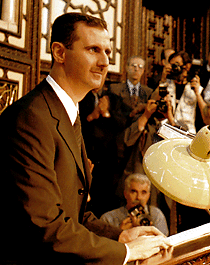Nations Follow U.S. Lead in Closing Diplomatic Relations with Syria
Feb. 8, 2012
France, Italy, Germany, and Spain yesterday followed the lead of the United Kingdom and the United States in recalling their ambassadors from Syria.The six Gulf Cooperation Council states–Bahrain, Kuwait, Oman, Qatar, Saudi Arabia, and the United Arab Emirate–also announced that that they were withdrawing their envoys as well as expelling the Syrian ambassadors from their capitals. The United Nations (UN) estimates that at least 7,200 people have died in the government crackdown on the 11-month-old rebellion against the regime of Syrian President Bashar al-Assad. His father, Hafez al-Assad, a member of the Baath Party and commander of the air force, took power in Syria in 1970. He ruled until his death in 2000. Bashar al-Assad succeeded him as president.
The United Kingdom and the United States recalled their ambassadors on February 6. Speaking in the House of Commons, British Foreign Secretary William Hague labeled Assad’s regime “murderous” and stated: “There is no way it [the Assad regime] can recover its credibility internationally or with its own people.” After the U.S. Department of State issued a statement announcing the closure of the U.S. embassy in Damascus, international affairs experts suggested that it sent a strong signal that the administration of President Barack Obama believed there is nothing left to discuss with Assad.

The government of Syrian President Bashar al-Assad continues to kill civilians opposed to his regime despite international condemnation. AP/Wide World
On February 4, Russia and China vetoed a UN Security Council resolution (a formal expression of opinion) calling for Assad to step down. All 13 other members of the council, including France, the United Kingdom, and the United States, voted for the resolution, which backed an Arab League plan to halt the violence. After the vote, Secretary Hague noted, “More than 2,000 people have died since Russia and China vetoed the last draft resolution in October 2011. How many more need to die before Russia and China allow the UN Security Council to act?” Government forces in Syria renewed the shelling of the city Homs, the epicenter of the 11-month-old rebellion, as the UN vote took place.
Additional World Book articles


